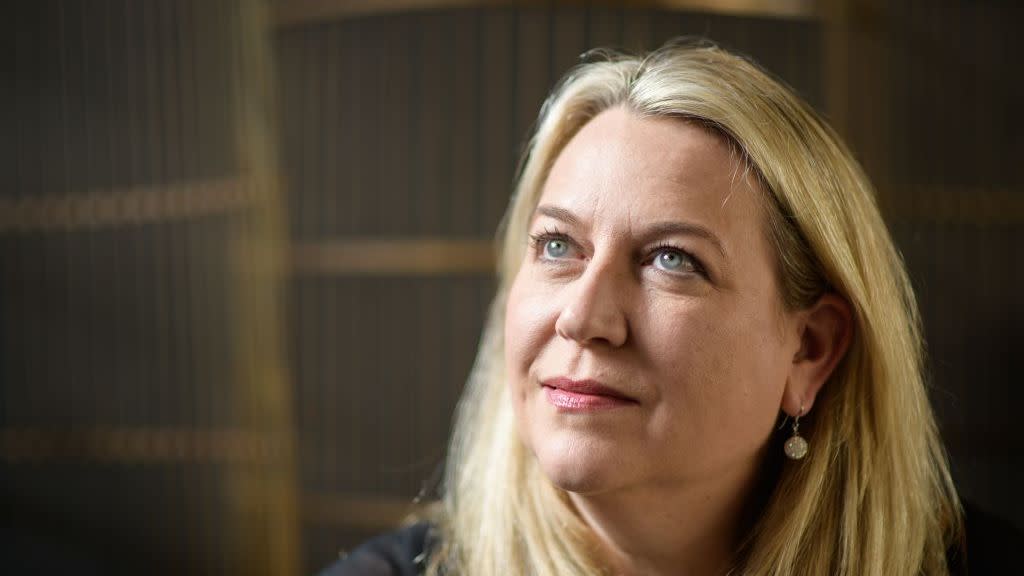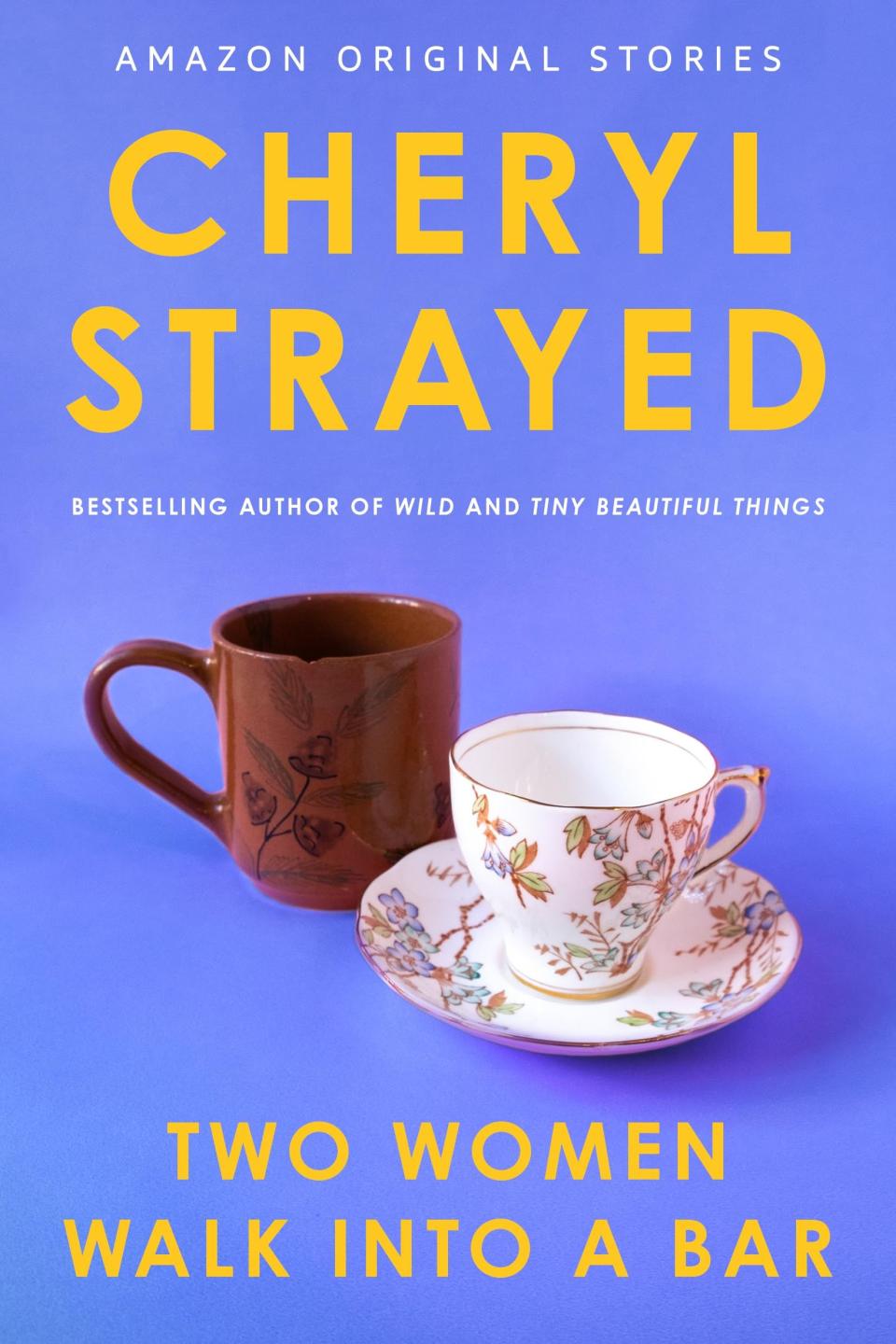Cheryl Strayed on Her New Sober-ish Life

- Oops!Something went wrong.Please try again later.
"Hearst Magazines and Yahoo may earn commission or revenue on some items through these links."
I was sitting on a bench in a bustling tourist town on a hot summer day in Greece when the thought first came to me: drink less. I’d just recovered from a Covid infection that had derailed my family vacation and kept me inside for days alone in a hastily rented apartment. It felt astonishing to be back in the world, my perception heightened as I watched hordes of people pass by. It felt as if I could see and feel everything more clearly than I had the week before. It was in this state that those two words—drink less—pierced my consciousness with such clarity they felt like a command. Like there was something I should get up and do immediately, though it was not doing something that I had to work on.
No more drinking two and occasionally three glasses of wine most evenings at dinner. No more telling myself there wasn’t a problem because I didn’t have any actual problems caused by alcohol. On that day on that bench, I allowed myself to know what I’d refused to know before: that I was drinking too much—more than double what the Centers for Disease Control and Prevention considers moderate for women, which is seven drinks or fewer per week.
“That can’t be right! I’m a moderate drinker!” I’d insisted at my annual examination several months before, when my doctor informed me that the CDC classified my drinking as excessive. My cholesterol levels had crept toward the danger zone, and she told me my level of alcohol consumption could be the reason.
I left her office feeling annoyed and indignant, silently making all the arguments in my head about why it couldn’t be true that I drank excessively. I didn’t get drunk. I didn’t wake up hungover. No one had ever expressed concern about my drinking. No area of my life—from career to marriage to mothering to friendships—had been negatively impacted by my daily habit of having a couple of drinks and occasionally one or two more than that. In fact, I put my drinking in the positive column. A couple of glasses of wine at the end of each day was my reward. It helped me relax and release a bit of the stress caused by my busy life.
Still, that conversation with my doctor unsettled me enough that I began to do some research. It didn’t take long to determine that the news was grim. “No level of alcohol consumption is safe for our health,” the World Health Organization bluntly states on its website. Alcohol is classified as a Group 1 carcinogen by the International Agency for Research on Cancer—the highest risk category—alongside things like radiation and asbestos. Alcohol consumption increases our risk of heart and liver disease, of dying in motor vehicle accidents, of having a stroke or dementia. It weakens our immune systems and negatively impacts everything from our mental health to—indeed—our cholesterol levels.
I read these things and worried, but I didn’t yet moderate my drinking. I loved it too much. While I hadn’t experienced symptoms of a physical addiction to alcohol, I felt psychologically tethered to it. When I tried to imagine myself not having a couple glasses of wine at the end of most days, I felt antsy and irritable. I decided that perhaps I was making too much of those grim statistics. Perhaps they weren’t truly aimed at people like me. Plus, there were so many people like me, friends and acquaintances who drank as much or more than I did. If they were fine, I was fine, I reasoned. The tiny voice of truth that lived in the deepest part of me knew I’d eventually have to make a change, but the part of me that ran the show decided to put it off until someday.
For now, I deserved this small, ordinary pleasure in my life, the far-off risks of cancer and dementia and high cholesterol be damned.
I don't know why it took a week sick with Covid in a foreign country to rattle myself out of what I can only call denial, but it did. Perhaps it’s that, in my feverish state, I felt my own fragility and I knew I could do more to safeguard my health once I felt better again. Perhaps my sickbed sobriety allowed me the touch of clarity I needed to finally commit. Whatever it was, once I exited that rented apartment, I’d stepped into the world of someday. A world in which I’d radically change my relationship with alcohol by drinking less.
When I first began, my intention was to follow the CDC guidelines for a moderate drinker and consume no more than seven drinks a week. I downloaded a mindful drinking app and planned my week each Sunday, as if drinking or not drinking was an appointment I was making with myself. I opted to consume my weekly allotment over a few days, rather than dole out one drink a day, which meant I’d be abstaining from alcohol four days a week. To distract myself during those sober dinner hours, I sampled a long line of mocktails and non-alcoholic wines, most of which tasted like apple cider vinegar and ended up down the sink.
I’d imagined I’d feel deprived on those non-drinking evenings, grumpy and impatient for my next drink—and in the beginning, I often did feel that way—but a couple of weeks in, to my great surprise, my cravings waned. I didn’t long for a drink. I didn’t even need to placate myself with an expensive glass of adulterated apple cider vinegar. I didn’t need anything.
And when I did have the pull to drink, I did what I’ve learned to do any time I’ve decided to be more mindful about anything—I slowed down. I took a breath and let myself wonder what was really going on. Almost always I realized I didn’t truly want a drink. Instead, the impulse came from patterns of habit that had developed subconsciously over years. Once I stopped drinking most days, I could see how very much I’d conflated drinking with so many other things. Gathering with friends. Flying on airplanes. Cooking dinner at home. Dining out in restaurants. Celebrating good news. Consoling myself after hard days.
Drinking mindfully, I came to understand, wasn’t about doling out a prescribed number of drinks. It was about untethering myself from the belief that alcohol was synonymous with any of those things. When I’d decided to drink less, improving my physical health had been my main intention, but it didn’t take long for me to understand that my mental health benefited too. Once I broke my drinking habit, I could see how central alcohol had been to my life, how much I’d thought it was all but necessary when it came to fun and relaxation, stress relief and socializing.
And I had done it in part because I’d been thinking about drinking in a dangerously binary way. There are so many messages from the culture that tell us there are two kinds of drinkers—those who have alcohol use disorder and those who don’t—as if there’s a bright line between the two groups and if you happen to fall on one side of it, you can drink your head off without concern. But drinking exists on a spectrum, and you don’t have to be on the far end of that spectrum to realize you need to make a change. You don’t have to have a drinking problem to have a problem with drinking.
A couple of months in, I decided to take a break from alcohol for 50 days. After that, I began having a drink or two on occasion, often with weeks or months in between. A year and a half into my new soberish life, I’ve come to think of alcohol like birthday cake. Something I consume every now and then with pleasure—not a reward at the end of each day, but a special treat when the occasion calls for one.
“What did you do?” my doctor asked in astonishment when she entered the examination room on my most recent visit. I beamed with pride, knowing exactly what she was referring to—my cholesterol levels, which I’d seen in my online health portal earlier that day. I weighed the same as I had when I’d last seen her. But my cholesterol levels were no longer in the danger zone.
“I drink less,” I told her. Though really, I’d done something more than. I’d set myself free.

Two Women Walk into a Bar, by Cheryl Strayed
amazon.com
Cheryl Strayed is the author of Two Women Walk Into a Bar, Tiny Beautiful Things, Wild, Brave Enough, and Torch. She writes the “Dear Sugar” column on her Substack newsletter.
You Might Also Like

